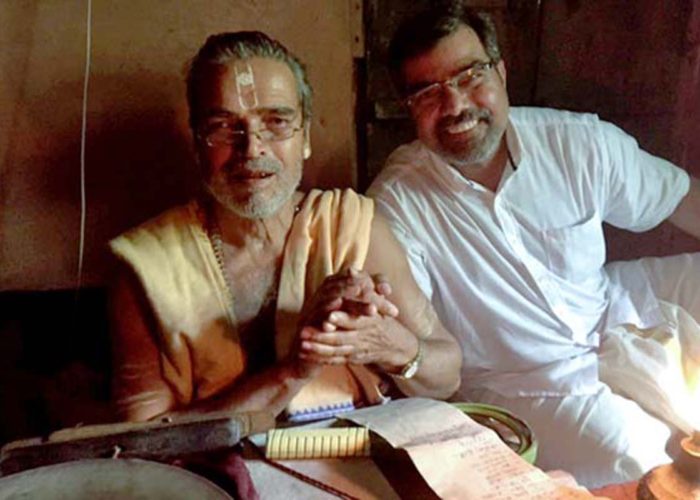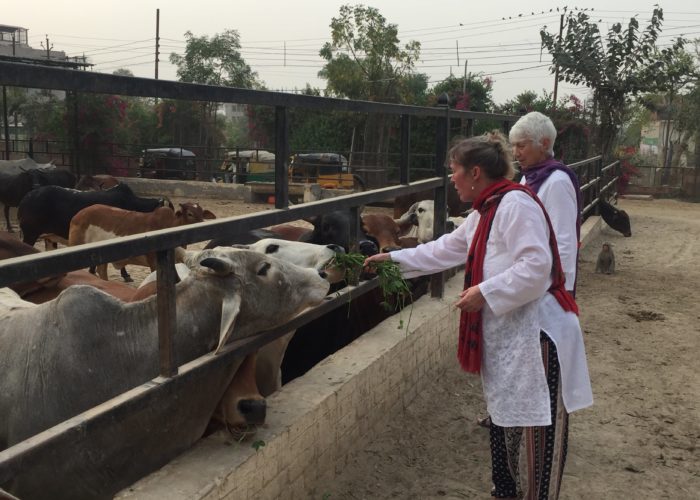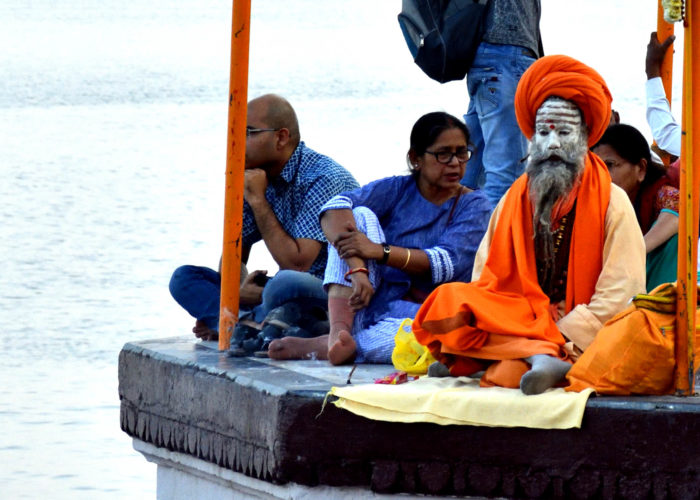




MJI – Mystical Journeys India was created by Rajiv Tomar in year 2000 with the idea of helping spiritually inclined souls connect with the ancient Indian Vedic culture through extra ordinary experiences, participating, observing & supporting traditional culture, hundred thousand years old rituals & its historical interpretations, exploring sacred and mystical sites of ancient Indus valley civilization from ancient Jyotirlingas to Shaktipeetham, historical char Dham to Himalayn mini Dhams, energy centers to Panch Bhutam, ancient excavations to soul searching temples, from astrological sites to yoga and de-toxin centers, Ayurvedic retreats to Himalayan ashrams, oldest festival sites to Nadi Patras to Bhragu Samhitas and many more.
MJI – Mystical Journeys India was created by Rajiv Tomar in year 2000 with the idea of helping spiritually inclined souls connect with the ancient Indian Vedic culture through extra ordinary experiences, participating, observing & supporting traditional culture, hundred thousand years old rituals & its historical interpretations, exploring sacred and mystical sites of ancient Indus valley civilization from ancient Jyotirlingas to Shaktipeetham
Pilgrimage is a search for meaning, purpose, values or truth (and in this sense, like life). This investigation is about the committed practice of many members of faith communities to complete a pilgrimage. It is the practice of journeying to sites where religious powers, knowledge, or experiences are deemed especially accessible. Pilgrimage is rooted in ancient scriptures, the earliest reference to pilgrimage is in the Rig-Veda (c. 1500 BCE), in which the “wanderer” is praised.
Sacred pilgrimages help you navigate life, linking more transparently to a higher reality. The purpose of sacred pilgrimage is “a progressive awakening of the soul” from the slumber of heedlessness. It is about parallel exterior and interior movement towards the deep self.
The epic Mahabharata and several mythological Paranas elaborate on the capacities of particular sacred sites to grant boons, such as health, wealth, progeny, and deliverance after death. Texts enjoin Hindu pilgrims to perform rites on behalf of ancestors and recently deceased kin.
In mystic traditions, particularly in India, life is regarded as a journey. A pilgrimage is merely an external projection of an inward journey. Before you can determine who is a pilgrim, you need to be clear about some aspects of pilgrimage.
A place of pilgrimage is one where a manifestation of divinity appeared for a particular purpose, where a sage performed austerities or meditated for a long period, or where someone got direct experience of God. One or more specific areas within the holy place get marked as a sanctum sanctorum, due to a still palpable divine power, like a vortex of energy. Many of us has personally experienced this vortex in many places, particularly while taking a dip in the Ganga at the Kumbh Mela in Haridwar. A pilgrimage is undertaken with many spiritual goals in mind. It may be an act of acknowledging to oneself one’s failures and misdeeds. You may aspire for freedom from this burden of misdeeds through prayaschitta, an act of atonement and purification. It could be in the form of renouncing a habit, addiction or worldly pleasure after the pilgrimage is complete.It is not a myth that if a pilgrim is one who fulfils all the requirements, he may be granted the rare darshan of a sage who left the body thousands of years ago, but still dwells there as a light being. You will feel the energy to the degree your mind is attuned. If you blanket your mind with the elements of the unsettled, the non-sacred, the mundane, and carry your anger and impatience with you, the energy plays hide and seek, and you return without being recharged. While a pilgrimage is not the highest endeavor, it is far more conducive to self-enquiry and enrichment than a holiday. Rather than attending a lecture on silence, it is better to practice silence. Go on an internal journey rather than an external one.
If done earnestly the right way, it cleanses the mind, unburdens the heart, and you become confident in your capacity to explore your inner world. You then renounce pleasures you are addicted to and come to realise that you have the spiritual strength to live without them. Begin a pilgrimage with an inner resolve or sankalpa, abandoning comforts, renouncing pleasures, remaining silent and still, practising celibacy, practising restraint in matters of food, accepting whatever the stations in the journey have to offer, controlling speech and all the senses and withdrawing from desires and from memories thereof.
Many spiritual seekers share Kabir’s view: “If taking a dip in a river would grant me liberation then the fish would have been liberated long ago.” Hence the internal journey is far more important than the external one. A holy place is called tirtha, a point of crossing over. Let a pilgrimage be a point of crossing over, a transition to a higher level of thought, action and existence. Go with the resolve: “After the pilgrimage, I shall be a higher self, purer, brighter, more stilled, more akin to my own interior divinity.” After the pilgrimage, be not what you were before. Let your life become a journey to your internal sanctum sanctorum. Until that final realization happens, you will continue to remain a pilgrim. Thereafter, you become a guide to other pilgrims who might follow you, seeking to grasp the vessel of God’s elixir of immortality, the Aquarian fullness, the essence of enlightenment.



We’re all about helping you to discover more of what ancient India has to offer. Our full-time expert tour leaders live and breathe of India
A nexus of cosmic energies brings the dramatic changes in the destiny of the human race.
This remarkable event has to be experienced to be believed “it’s the journey and not the destination”
The Kumbh Mela derives its name from the immortalizing pot of nectar described in India’s ancient scriptures. Kumbh in the Sanskrit language means “Pot,” “Pitcher” or” Jar” and Mela means “Festival”. The origin of this festival lies in the ancient belief in the conflict between the Gods and Demons over the possession of the “Amrit Kumbh’, a pitcher filled with nectar.
“Sankalpa, a sanskrit word that means to have a clear intension for a positive outcome. I learned this From Rajiv Tomar and James Kelleher and Now it holds a deep meaning in my heart. Rajiv and James held a sankalpa for our mystical journey together that was so powerful, their intension so clear that we received many magical gifts. It brought us wonderful experiences together as a group and clearly deepen each of our own spiritual journeys. I am more connected to myself through having had so many incredible experiences with these two men, I am forever grateful. This trip was completely well organized, I was able to relax because I felt completely safe and protected the entire time I was in their care. I highly recommend Mystical Journeys for any opportunity to travel with them. I know I will again and I will recommend all my friends to do the same”
“My experience with Mystical Journeys (to the Maha Kumbh Mela festival in India January 2001) was truly excellent. Everything was well organized, accommodation and meals were very good, and it was possible to have an once-in-a-lifetime experience that would have been extremely difficult to arrange through any other company. Guiding a diverse group of Westerners through a festival attended by close to 100 million people was a difficult challenge but the Mystical Journey’s staff managed it with great efficiency, patience and kindness. Above all, I was impressed by their constant dedication and concern for the welfare of those on the trip.”
“It has been a year since I toured India. I think every day I mention to someone something about that experience. I feel so lucky to do this tour with Mystical Journeys, because of their ability to organize a trip taking care of all the logistics, making sure our food and water are safe so we don’t get sick, but still covering a lot of territories, being flexible, and adventurous. This is not your typical coach riding tour. You get in the heart of the culture and get in to do things that the average independent traveler could never do. I went on this tour by myself, made many friends, and consider it a life-changing experience with nothing but positive things to say. I highly recommend Mystical Journeys to guide you so you can relax and focus on the spirit of India”










